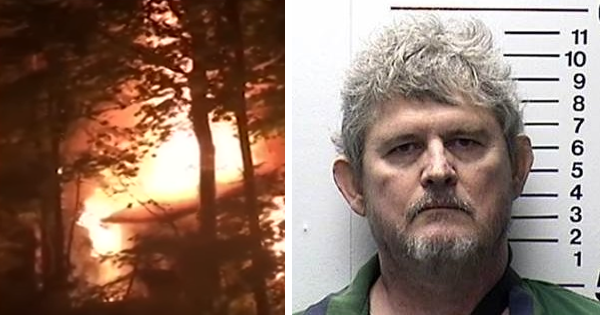Advertisement
Ross Compton called 911 after his home in Middletown, Ohio caught on fire. He had already gotten out at the time, and he mentioned that he’d even had time retrieve some clothes, that he’d put in a luggage, his computer, and even chargers for his medical devices.
He got out, he explained, by breaking a hole in the window with his cane and hurling the packed bags through the opening.
But the investigators were suspicious. Compton had had enough time to save not just a handful, but at least 15 of his belongings.
It would take anyone a lot of time to pack and prepare 15 items to save while being threatened by a fire – especially for a man, like Compton, who had a pacemaker and relied on an external heart pump to live.
Deputy Fire Chief Jeff Spaulding was also suspicious of other things as well. The fire had started in a small number of places around the house and he could smell the telltale odor of gasoline lingering even when the fire was put out.
There wasn’t, however, enough solid evidence to charge Compton with arson. Until investigators realized – they could determine precisely how quickly Compton had supposedly been scrambling to save his belongings by checking his pacemaker.
“We’d be able to see did he exceed his threshold limit,” Spaulding explained. “Or did his pulse drop below a certain rate. It won't say what you're doing, obviously, but it would help corroborate his story. It was much more informative than we thought.”
When the investigators looked into Compton’s pacemaker records, they discovered the truth: He’d made up the entire story.
The data from the pacemaker didn’t line up with the times Compton said he’d rushed to pack his bags and gather his belongings before throwing them out the window. Due to his medical limitations, Compton would have needed far more time to do all the things he’d claimed he’d done in the short period of time he had before dialing 911.
Compton has since been charged with aggravated arson and insurance fraud. “A grand jury indicted him last month after a doctor testified that he couldn't have done the things he claimed during the fire.”
The man in question, however, maintains that he isn’t guilty despite the evidence against him. A cardiologist even reviewed the data collected from Compton’s pacemaker and concluded, “it is highly improbable Mr. Compton would have been able to collect, pack and remove the number of items from the house, exit his bedroom window and carry numerous large and heavy items to the front of his residence during the short period of time he has indicated due to his medical conditions.”
You can watch the full news report here:




